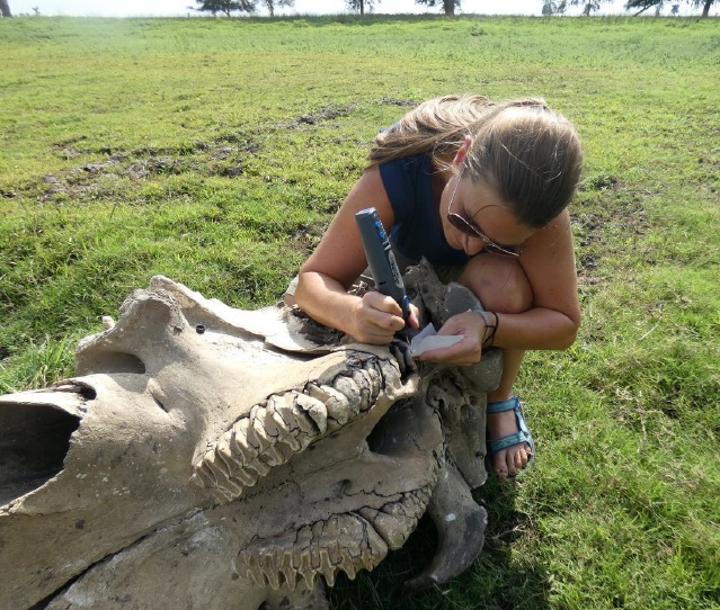
Africa-Press – Mozambique. Dr Tina Lüdecke is studying how the Gorongosa National Park fauna can help us understand when our human ancestors started to eat meat.
For her research into the onset and evolution of meat consumption in human ancestors, Dr. Tina Lüdecke will receive €1.3 million from the German Research Foundation (DFG). Lüdecke is a research associate at the University of Oxford and has served as the leading geochemist for the Paleo-Primate Project Gorongosa since 2016. She will use this funding to set up her own Emmy Noether Junior Research Group at the Max Planck Institute for Chemistry (MPIC) in Mainz, Germany. Over the next six years, Lüdecke’s group will investigate when meat entered the diet of our early ancestors and how its consumption developed over millions of years.
As a first step, the group will use teeth from modern herbivores, carnivores, and omnivores that died of natural causes in Gorongosa National Park to further develop novel methods for measuring nitrogen isotopes in tooth enamel. Here, Lüdecke will collaborate with Mozambican students that she plans to mentor. This work will allow her group to establish a modern comparative dataset for fossil studies.
In the next step, Lüdecke will concentrate on sampling mammalian teeth from Plio-Pleistocene hominin fossil sites in Ethiopia, Kenya, Malawi, and South Africa. She and her team will analyze fossil teeth to determine the nitrogen isotope signatures of animals with known dietary behaviors (e.g., meat vs. plant eating) that coexisted with early hominins. These data will serve as a baseline with which to compare the nitrogen isotope signatures of early hominins. Taken together, this information will help us gain a better understanding of the dietary habits of early hominins, including meat consumption in different hominin groups. Theories of human evolution often invoke an increase in meat consumption as a key adaptation of early hominins, so this new research will provide a critical test of these ideas.
About the Gorongosa Project
Gorongosa National Park (GNP) in Mozambique is perhaps Africa’s greatest wildlife restoration story. In 2008, a 20-year Public-Private Partnership was established for the joint management of GNP between the Government of Mozambique and the Carr Foundation (Gorongosa Restoration Project), a US nonprofit organization. In 2018, the Government of Mozambique signed an extension of the joint management agreement for another 25 years. By adopting a 21st Century conservation model of balancing the needs of wildlife and people, Gorongosa is protecting and saving this beautiful wilderness, returning it to its rightful place as one of Africa’s greatest national parks. GNP has been described as one of the most diverse parks on Earth, covering a vast expanse of 400,000 hectares. In recent years, the Gorongosa Project, with the support of Mozambique’s National Administration of Conservation Areas (ANAC), has ensured the protection of a recovering population of lions in this system, successfully reduced key threats, and has been recognized as one of National Geographic’s “Last Wild Places” and by TIME Magazine as one of the “World’s Greatest Places – 2019”.





